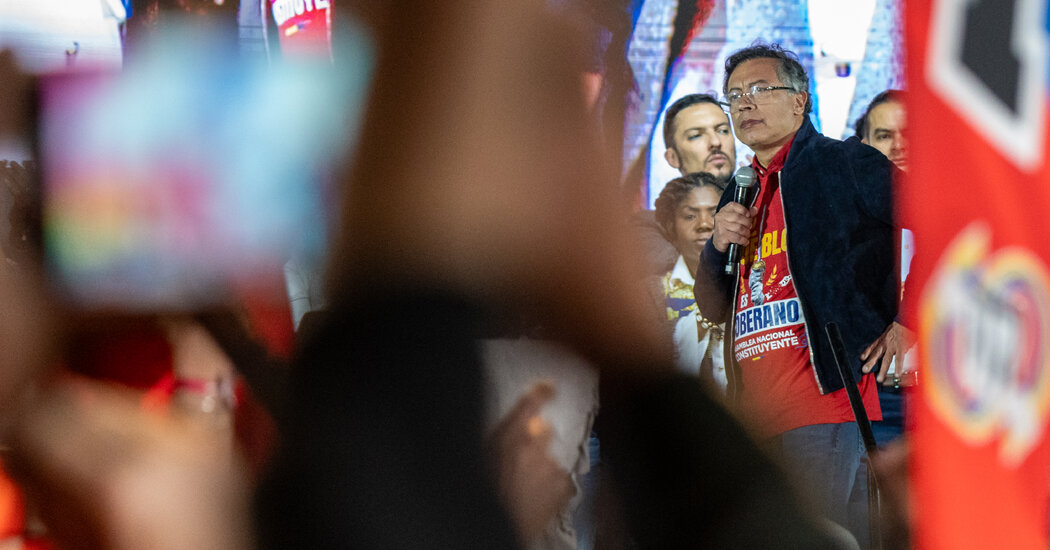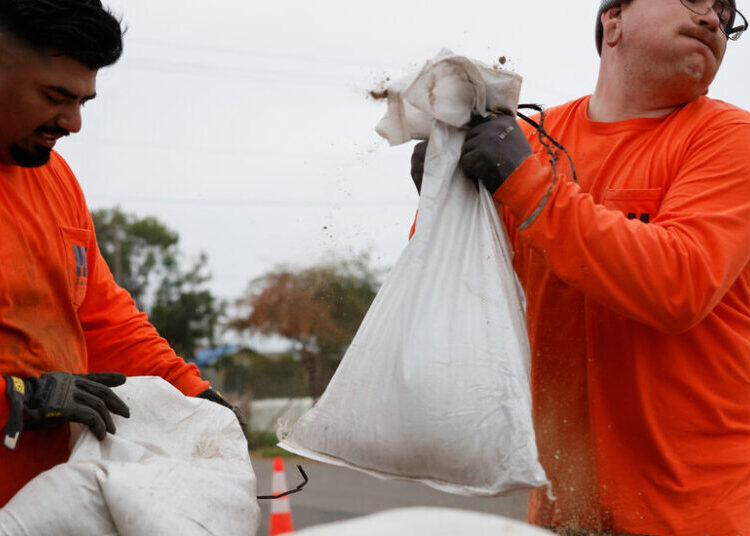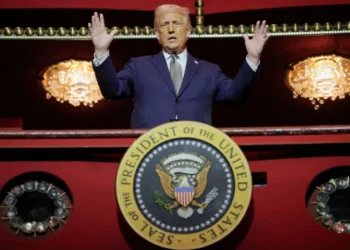Few leaders have dared take on President Trump so openly as President Gustavo Petro of Colombia.
While many have treaded carefully since Mr. Trump took office, Mr. Petro has infuriated him, blocking deportation flights, standing on the streets of Manhattan urging U.S. soldiers to disobey orders and accusing the United States of “murder” in its boat strikes in the eastern Pacific.
On Tuesday he announced the suspension of any intelligence sharing with the United States as long as the boat strikes continue.
Mr. Trump has responded by calling Mr. Petro an “illegal drug leader’’ and his administration has yanked his visa and put him on a sanctions list usually reserved for major criminals and human rights violators.
For Mr. Petro, a former rebel during Colombia’s long and brutal internal conflict, defiance is nothing new. Those who know him describe a man propelled by his convictions — a lifelong critic of corruption and inequality who became the fiery face of Colombia’s left.
That same impulse, they say, now fuels his willingness to take on Washington, even as his government is hobbled at home by persistent violence, scandal and cabinet upheaval.
To admirers, his confrontation with Mr. Trump is the biggest battle of a decades-long crusade against the powerful. To detractors, it’s a reckless display of ego, and shows a leader more focused on promoting himself as a global moral champion than on governing effectively at home.
Colombia’s ambassador to Washington, Daniel García-Peña, lauded Mr. Petro for pushing necessary debates onto the world stage.
“I think that he’s on the right side of history,” he said at his home in Bogotá after Mr. Petro briefly recalled him during a recent diplomatic spat. “He has been in my view very, very brave to be able to to stand up and to say what he believes.”
But Mr. Petro’s former education minister, Alejandro Gaviria, who resigned in early 2023 after objecting to a proposed government health measure, said that while he might have “a genuine concern” for humanity, he did not “internalize the consequences, impacts, or effects on Colombia.’’
That tension, between ambition and diplomacy, has defined his recent standoff with Washington. The United States revoked his visa in September after, speaking at a pro-Palestinian rally in New York, he called on American soldiers to disobey Mr. Trump.
Since then, the Trump administration has accelerated a campaign to destroy boats and kill crew members it says were smuggling drugs. Many legal experts have called it extrajudicial killing.
The attacks started in the Caribbean but spread to the eastern Pacific and hit boats Mr. Petro said were carrying Colombians.
After he accused the United States of murdering a Colombian fisherman, Mr. Trump threatened aid cuts and tariffs, accused Mr. Petro of being a drug kingpin and imposed some of the most severe sanctions in the U.S. arsenal on Mr. Petro, his relatives and his interior minister.
The confrontation has won Mr. Petro praise from the global left, but alarmed many at home, where Colombia depends on the United States for trade and counternarcotics cooperation.
Critics say his foreign policy approach is ideological rather than pragmatic.
Mr. Petro, Mr. Gaviria said, thinks “he is expressing truths that no one else is expressing.”
A former environment minister, Susana Muhamad, said caution had never been Mr. Petro’s style.
“His entire political life has been about taking risks,” she said. “Walking the edge of the abyss to push for change, to create tension, to expose what’s really going on.”
Born to a government auditor and homemaker, Mr. Petro joined the M-19, a leftist militia, at 17, appalled, he said, by the poverty near his home outside Bogotá.
Smaller than the Revolutionary Armed Forces of Colombia, or FARC, which operated from rural strongholds and raised money through the drug trade, the M-19 drew urban students, activists and artists challenging what they saw as an elite oligarchy.
The group tried to cultivate a Robin Hood image, robbing milk from trucks and distributing it to poor neighborhoods.
Though less ruthless than other insurgents, it carried out one of the deadliest acts of Colombia’s decades-long internal conflict: the 1985 siege of the national judicial building, which left 94 dead in clashes with the police and the military.
Mr. Petro, at the time imprisoned for his M-19 membership, was not involved and has said he was tortured in prison.
He later helped negotiate the group’s 1990 peace deal with the government, transforming the M-19 into a political party that helped draft Colombia’s 1991 Constitution, which emphasizes equality and human rights and is considered one of the most successful byproducts of the peace process.
Mr. Petro soon entered Congress, gaining prominence for exposing ties between paramilitaries and politicians — revelations that led to dozens of indictments but earned him powerful enemies in a country polarized by a complex war among left-wing guerrillas, right-wing paramilitaries and the state.
He became admired by progressives and distrusted by conservatives, who have never let go of their belief that Mr. Petro is, at heart, an unyielding leftist insurgent.
In a country where class hierarchy is literally codified — neighborhoods are ranked from one to six, poorest to richest — Mr. Petro challenged Colombia’s hereditary elite. He embraced his outsider image, favoring jeans and open-collars and quoting Foucault, casting himself as both an intellectual and a man of the people.
As Bogotá’s mayor from 2012 to 2015, he cut public transit fares and subsidized water for the poor, cementing his progressive reputation but frustrating critics who saw him as an idealist uninterested in the daily demands of running a sprawling, chaotic city.
In 2022, he won the presidency, becoming Colombia’s first leftist leader, a watershed in one of Latin America’s most conservative nations that captured global attention.
He promised sweeping social and economic transformations, but critics say he has fallen short. While he has advanced land redistribution and environmental initiatives, Mr. Petro’s pledge to bring lasting peace to a country scarred by decades of bloodshed has faltered, and his popularity has fallen.
Conservative critics denounce his guerrilla past and his rapprochement with Venezuela’s autocratic government, and criticize him for giving ex-combatants a formal role in the peace process.
Disillusionment has spread even on the left.
“His administration has been disastrous,” said María Jimena Duzán, a prominent Colombian journalist who supported his candidacy. “His policies — many of which are very good and truly innovative — were never implemented.”
Known for bold initiatives and an authoritarian streak, he has often clashed with advisers, including Mr. García-Peña, who resigned as director of international relations over another official’s dismissal, calling Mr. Petro “a despot.” Mr. Petro later appointed him as ambassador to the United States.
Mr. Petro’s long, often digressive speeches — sometimes infused with conspiracy theories — deepen perceptions of a presidency adrift.
He has warned of a Dubai-based criminal network supposedly targeting him, claims the police say lack conclusive evidence.
In a rambling post addressed to Mr. Trump in January, he mentioned “Washington’s Black neighborhoods,” the singer Paul Simon, Egyptian pharaohs and his experiences with gastritis.
Ms. Duzán has asked whether substance abuse might be behind his extended absences and disjointed social media posts. A former minister has also publicly accused him of drug use. Mr. Petro dismissed that, responding that “the only addiction I have is to coffee.”
Supporters say efforts to portray him as erratic or incompetent are part of a coordinated backlash from political and media elites who resent his power.
But while Mr. Petro has long been targeted by elites, he takes it a step further and “feels that everyone is always persecuting him,’’ said Federico Gómez Lara, the director of a Colombian political magazine, Cambio.
Mr. Petro’s clash with Mr. Trump has divided Colombians over whether to confront or appease Washington. Mr. García-Peña argued that appeasement has failed other nations and said Mr. Petro’s defiance has earned him admiration at home and abroad.
Still, unease is spreading in the Bogotá establishment, Mr. Gaviria said. “There’s a sense that the environment is becoming increasingly unstable,” he said. “That Petro no longer has any limits.’’
Officials are eager to play down the feud with Mr. Trump as a misunderstanding.
Defense Minister Pedro Sánchez said Mr. Petro was “obsessed with combating drug trafficking” and the interior minister, Armando Benedetti, said that “our major failure has been that we have not been able to get that message across to Trump.”
But Mr. Gómez Lara thinks the president relishes the conflict.
“Gustavo Petro has always lived within a logic of confrontation,’’ he said. “He needs an enemy in order to function. It was the paramilitaries, then the political class, then Netanyahu,” a reference to the Israeli prime minister, Benjamin Netanyahu.
“Now it’s Donald Trump,” he said.
Genevieve Glatsky is a reporter for The Times, based in Bogotá, Colombia.
The post The Rebel Turned President Willing to Take On Trump appeared first on New York Times.




